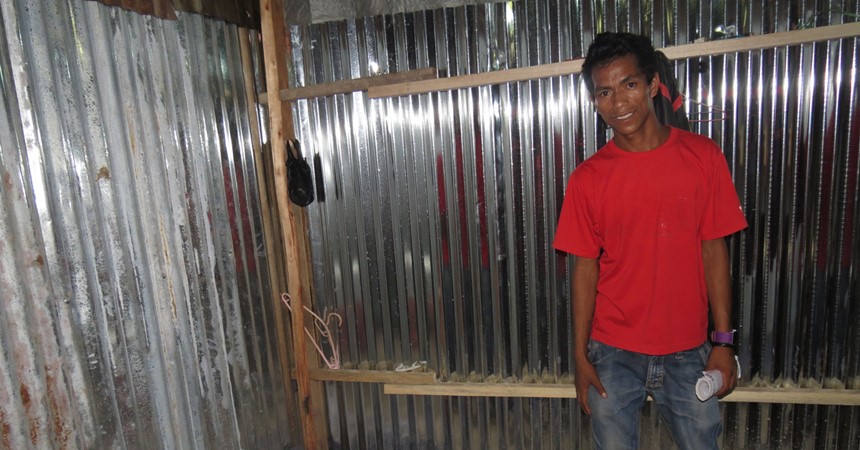“Love one another. Just as I have loved you, you also should love one another.” Jn 13:34.
At the end of Year 12, I chose not to go on the ‘normal’ schoolies trip to the Gold Coast or camping with friends. Instead, I went on a trip with Catholic Mission’s Getting Involved Globally (GIG) Immersion program to Timor Leste. Participants in GIG immerse themselves in the culture and life issues of people in a majority (third) world context by engaging with ordinary people, key community groups and church leaders. Visiting Timor Leste was an amazing experience that I will never forget.
Our group of ten Year 12 school leavers from all over Australia left on 1 December 2014. We started as strangers but returned as close friends. We shared an intensely real experience that allowed us to bond together, and with others of the world.
On the first day, we climbed 500 steps to the 27 metre-high Christo Rei Statue. This statue of Jesus, located atop a globe in Dili, is one of the main tourist attractions in East Timor. From here, we could see parks, markets, barren mountains, shanty-style tents, dilapidated buildings, the university, the churches and the vast, clear blue ocean. I was struck by the contrast of Dili with Australia; Dili is overcrowded, busy, and brown compared with Australia’s wide open landscape which is so much greener and more peaceful.
I stayed three nights in a Dominican Orphanage for children aged six to 18 years in the heart of Dili. The orphanage, run by nuns, was basic with just an old, well-used bunk bed per child. The mattresses were almost worn through and there were no bottom sheets or pillows, just a thin bed sheet to cover them. Each child had a plastic tub with a few t-shirts shorts or skirts and their Sunday best. The toys for the whole orphanage of eighteen children were two tubs of old guitars, musical instruments and dolls. During the day we were out and about, but at night, after dinner, we sang and played games with the children. Wherever we went we taught the children the “cup song” using clapping and a cup .We also sang our national anthem and “Alleluia”, accompanied by a member of our group who had a guitar. They loved to sing us songs including their national anthem.
A special memory for me was sitting with the children making loom band bracelets as we were all in awe of their amazing talent. They had no technology except for one small television and they loved using our cameras to take photos.
We were confused at first as we kept hearing the children call each other brother and sister. We thought there must have been a lot of children from the same family in care at the orphanage. We realised that this was not the case and that the children just felt that every child living there was part of their family. I had also joined their family as they called me sister. This was a very powerful lesson to me; they taught me how easy it should be to “love one another”. In my diary that day I wrote, “I feel a lot of hope for the people at the orphanage that things will get better.”
We visited the Asisaun Foundation for young people with disabilities and met residents with huge smiles on their faces. Their challenges included learning difficulties and deformed or missing limbs and one had been shot in the leg. Some were getting their education online and others went to school, college or university. There was a computer room, a room to play cards, an onsite counselling room, a hospitality area to learn cooking skills, a music room and a quiet space with the Stations of the Cross. It made me realise that I am so lucky even though I have had some obstacles in my own life journey. The people were lovely and I learned that if they can get through hard times, so can I. I was inspired by their faith and their openness to loving life.
An Australian volunteer took us to the university and we met a 19 year-old student who had been sponsored to attend university. He happily showed us around and was proud to show us his home. We didn’t know what to expect but we were shocked to see that his accommodation was a corrugated iron shed that had no door, a dirt floor, a rolled-out mattress for a bed and no pillow or sheets. He and his roommate each had a small plastic tub for belongings and a separate one for kitchen supplies. They showered outside when it rained. The night before we visited there had been heavy rain and the shed had flooded. The only way to get to university was to walk fifteen kilometres. I felt sad because I couldn’t help and compared his situation with my similarly-aged brother who is a university student in Australia. We all had to hide our reactions to his humble home. This university student was faithfilled and felt blessed with what he had. We could only be happy for him as he truly celebrated the gifts of his life.
It is the hope of the GIG program that “participants grow to see the world differently, deepen their spirituality and commit to their faith in ways that will advance the reign of God by building a more just and peaceful world.” It was such an eye-opener for me to see how children and young adults are living and to witness their daily struggles in a country that is less fortunate than my own.
I was impressed by the hospitality and hope of the Timor Leste people and their strong relationship with Christ. I look forward to participating in overseas mission work again.






















































































